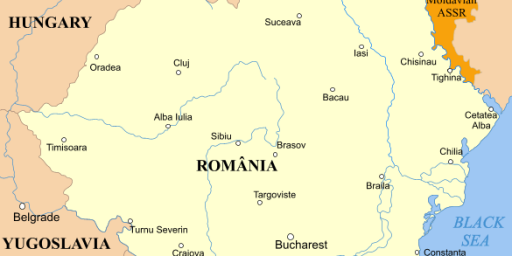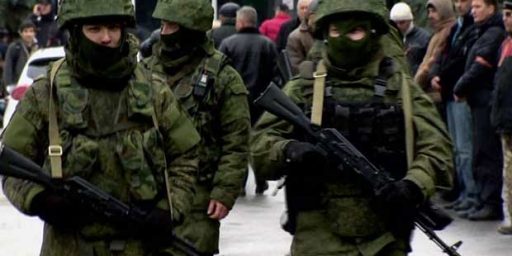WSJ Wonders About Transnistria, Too
Echoing my post of yesterday, the Wall Street Journal speculates whether Transnistria might be next on Putin’s agenda:
Transnistria voted in 2006 to ask to join Russia and this month its leaders repeated the request. Russia hasn’t taken up that appeal, but it did hold military exercises in the region last weekend. Another minority enclave in Moldova populated by the Turkic Gagauz people, who are pro-Russian, held its own Crimea-style referendum on Feb. 2 that called for independence if the Moldovans seek EU membership. In both cases, Russia could use force to cleave off these regions from Moldova.
Ukrainians are worried about another scenario. Transnistria’s capital Tiraspol is near Odessa, the Ukrainian port city founded by Catherine the Great, and only about 300 miles from Crimea. The southern Ukrainian regions along the Black Sea are full of Russian speakers. After his Crimean conquest, Mr. Putin now could move on to claim his “corridor”—another historically pregnant phrase—to link Crimea and Transnistria. He has the forces in the peninsula to do it.
It’s a trend! Deutsche-Welle quotes a man living in Tiraspol (capital of Transnistria):
“We Slavs should live under Slavs – and Russia is on the right path politically,” said a man with a gray moustache, browsing a Tiraspol flea market. A blind street musician played the accordion while older people offered their wares, from buttons with Soviet symbols to secondhand shoes and plumbing pipes. Like the moustached flea market visitor, 60 percent of Transnistria’s half-million citizens speak Russian. The man said he has nothing against the Republic of Moldova or its Romanian-speaking people. He studied engineering in Moldova’s capital, and said he is not interested in speaking Romanian, the official language of Moldova, to which Transnistria continues to officially belong.
But when it comes to political problems, in his view, it isn’t Moldova’s government that is at fault, but rather a great conspiracy by the United States. “Yugoslavia used to be a paradise, but the Americans turned it into hell,” he said. “They’ve now done that with Ukraine – and that will also happen in Moldova.”
and ITAR-TASS reminds us talks over Transnistria’s status are remaining on schedule:
Talks on the settlement of the conflict over Moldova’s breakaway region of Transnistria have not been postponed, Russia’s ambassador to the OSCE has said.
“We expect the talks to be held on the date,” Russian permanent representative to the OSCE Andrei Kelin told a video conference on Friday.
The talks within the 5+2 format (Russia, Moldova, Transnistria, Ukraine, the OSCE and observers from the EU and the US) are scheduled for April 10-11.






Dave, if Russia takes Odessa along with the shoreline east to Crimea would that leave Ukraine landlocked?
I think the best way to think about it is in terms of corridors. If Russia maintains a corridor from its border with the Ukraine to the north to Sevastopol, more or less following the path of the oil pipeline, maintains another corridor from Sevastopol to Odessa, and then maintains a corridor from Odessa to Transnistria, then Ukraine is landlocked. Not to mention that the country is bisected north to south into western Ukraine and eastern Ukraine.
I think it’s also worth mentioning that all of these territories (Ukraine, Crimea, Transnistria) have been ethnically cleansed multiple times over just the last century. Transnistria was Russified, then it was Romanianized, then it was Russified again, just over the course of a century.
As I mentioned in a prior post, a century ago the territory now claimed by Ukraine had Germans, Poles, Ukrainians, Russians, Hungarians, Romanians, and Tatars leaving cheek by jowl. During the 20s and 30s many of the Germans were forcibly ejected, relocated (some to Canada), or otherwise moved. Some of the few that remained withdrew with the German army when it was routed from the Soviet Union. Tatars have been oppressed by just about everybody.
Not to excuse all of the oppression but that’s what it’s like in a territory without natural borders and the only natural border in Ukraine is the Dnieper.
Hey Dave, I may have been too young when the War in the Balkans started but why does Russia keep harping about Yugoslavia? IIRC Tito was strong willed enough to turn down Stalin on the offer of joining the Warsaw Pact. So it isn’t like they were part of the USSR and bloc countries. Also the idea anywhere were ethnic cleansing is occurring is an insult to history. My great grandparents ethnic Croats left Yugoslavia during WWI would always say the fear and hatred of Tito held that nation together, and then showing extreme cognitive dissonance talk about how the Croats could keep the country together for 50 years but when they let a Serb in charge this is what happens. That region was held together by oppressive empires and its various ethnic groups never seemed all too keen on one another. I guess I just don’t understand why they keep bringing it up.
@Dave D:
I assume they’re referring to the bombing of Serbia and Kosovo in the 1990s.
Pan-Slavism is pretty strong in Russia (from their point of view it more or less means that Russia would run a big chunk of Eastern Europe). Their interpretation of our intervention in Serbia and Kosovo is that we were siding with Turks and Albanians against Slavs.
I haven’t really studied what they think about it but I also suspect that, since we did not intervene there with a Security Council mandate, they consider it a violation of international law. Venue shopping, as we frequently do, does not confer greater legitimacy. The U. S. use of military force without Security Council authorization over the last couple of decades is pretty extensive.
That makes the president’s and John Kerry’s recent remarks particularly galling for them.
@Dave D: The history of Third Romanism is much older than WWI:
As the Third Rome, Russia expanded and intervened in protection of the Orthodox Christian, particularly Slavic, against the Catholic West and the Muslim South.
@PD Shaw:
That’s why I always chuckle when people claim that we derive our republican and libertarian values from Greece and Rome. Russian authoritarianism and autocracy and American republican and liberal values are both being defended using (in part) the same arguments.